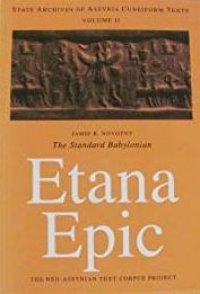
Ebook: The Standard Babylonian Etana Epic: Cuneiform Text, Transliteration, Score, Glossary, Indices and Sign List
Author: Jamie R. Novotny Simo Parpola
- Series: State archives of Assyria. Cuneiform texts
- Year: 2001
- Publisher: Neo-Assyrian Text Corpus Project
- City: Helsinki
- Language: English
- pdf
Etana was an ancient Sumerian king of the city of Kish. According to the Sumerian king list, he reigned after the deluge. He is listed as the successor of Arwium, the son of Mashda, as king of Kish. The list also calls Etana "the shepherd, who ascended to heaven and consolidated all the foreign countries", and states that he ruled 1,560 years (some copies read 635) before being succeeded by his son Balih, said to have ruled 400 years.
A Babylonian legend says that Etana was desperate to have a child, until one day he helped save an eagle from starving, who then took him up into the sky to find the plant of birth. This led to the birth of his son, Balih.
In the detailed form of the legend, there is a tree with the eagle's nest at the top, and a serpent at the base. Both the serpent and eagle have promised Utu (the sun god) to behave well toward one another, and they share food with their children.
But one day, the eagle eats the serpent's children. The serpent comes back and cries. Utu tells the serpent to hide inside of the stomach of a dead bull. The eagle goes down to eat the bull. The serpent captures the eagle, and throws him into a pit to die of hunger and thirst. Utu sends a man, Etana, to help the eagle. Etana saves the eagle, but he also asks the bird to find the plant of birth, in order to become father of a son. The eagle takes Etana up to the heaven of the god Anu, but Etana becomes afraid in the air and he goes back to the ground. He makes another attempt, and finds the plant of birth, enabling him to have Balih.
So far versions in three languages have been found. The Old Babylonian version comes from Susa and Tell Harmal, the Middle Assyrian version comes from Assur, and the Standard version is from Nineveh .
(source: wiki)
A Babylonian legend says that Etana was desperate to have a child, until one day he helped save an eagle from starving, who then took him up into the sky to find the plant of birth. This led to the birth of his son, Balih.
In the detailed form of the legend, there is a tree with the eagle's nest at the top, and a serpent at the base. Both the serpent and eagle have promised Utu (the sun god) to behave well toward one another, and they share food with their children.
But one day, the eagle eats the serpent's children. The serpent comes back and cries. Utu tells the serpent to hide inside of the stomach of a dead bull. The eagle goes down to eat the bull. The serpent captures the eagle, and throws him into a pit to die of hunger and thirst. Utu sends a man, Etana, to help the eagle. Etana saves the eagle, but he also asks the bird to find the plant of birth, in order to become father of a son. The eagle takes Etana up to the heaven of the god Anu, but Etana becomes afraid in the air and he goes back to the ground. He makes another attempt, and finds the plant of birth, enabling him to have Balih.
So far versions in three languages have been found. The Old Babylonian version comes from Susa and Tell Harmal, the Middle Assyrian version comes from Assur, and the Standard version is from Nineveh .
(source: wiki)
Download the book The Standard Babylonian Etana Epic: Cuneiform Text, Transliteration, Score, Glossary, Indices and Sign List for free or read online
Continue reading on any device:

Last viewed books
Related books
{related-news}
Comments (0)